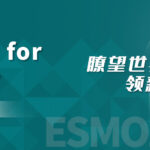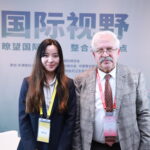In a recent interview, a renowned expert in the field of artificial intelligence (AI) and medicine provides valuable insights into their background, experience, and contributions. The discussion explores the impact of AI in the healthcare industry, the expert’s involvement in shaping health reforms in China, their industry experience at IBM, and their role in advising and mentoring startups. This article offers a comprehensive overview of the dialogue, amplifying key points and perspectives shared by Dr. Dimitris Kalogeropoulos.


Discussion between Oncology frontier and Dr Dimitris Kalogerpoulos :
Oncology frontier: In the media, we often see AI being utilized in projects like editing and proofreading. Can you tell us about your background and experience in artificial intelligence in medicine?
Dr. Dimitris Kalogeropoulos: I have been immersed in the field of artificial intelligence in medicine since the 1990s. At that time, it was a relatively rare domain, but I pursued research work as part of my PhD. My focus was on connecting data to evidence and knowledge, which I believed to be essential for AI to be meaningful and responsible. Over the years, I have continued to support multilateral organizations and governments in building data ecosystems for data-coupled innovations in healthcare. I worked as an advisor with the World Bank, World Health Organization and PAHO, and the European Commission.
Oncology frontier: Could you provide examples of projects where you have made significant impacts, both locally and globally?
Dr. Dimitris Kalogeropoulos: My work primarily centers around projects with international and long-term impact. One notable project is my current involvement in chairing a work stream within the IEEE Standards Association’s Healthcare and Life Sciences global practice. This initiative aims to establish a new standard for data recycling and open innovation ecosystems. By fostering collaboration and connecting innovative ideas, we can create positive change and deliver technology that benefits humanity.
Oncology frontier: How were you involved in shaping health reforms in China?
Dr. Dimitris Kalogeropoulos: I participated in a World Bank Group and WHO joint study partnership in 2015, which aimed at deepening health reform in China together with the Ministry of Finance, the National Health and Family Planning Commission, and the Ministry of Human Resources and Social Security. The focus of the digital health policy perspective was on leveraging patient-centric technology for value-based care. We recommended the establishment of an infrastructure for electronic health records, along with the creation of local connected innovation ecosystems that could be interconnected on a larger scale. Although effecting significant change in such a vast healthcare system presents challenges, even small changes are welcome and capacity building can lead to positive transformations.
Oncology frontier: Can you describe your industry experience at IBM?
Dr. Dimitris Kalogeropoulos: My experience at IBM was remarkable, and the company’s influence stays with you throughout your career. During my time there, I worked in the central banking sector and had the privilege of being part of the Southbank Centre. I was impressed by IBM’s culture, which emphasizes making technology useful for society rather than solely focusing on profit. It is crucial for large companies to invest time and effort in areas that prioritize the societal impact of their advancements.
Oncology frontier: Could you share your involvement with startups and the value you bring to these organizations?
Dr. Dimitris Kalogeropoulos: I have served as a mentor and coach for several startups in the healthcare and technology sectors. One particularly notable experience was with the Edison™ Accelerator, facilitated by GE HealthCare, where we witnessed remarkable innovation in collaboration with the NHS as a clinical validation partner. Assisting startups in refining their ideas and supporting their progress has been a rewarding endeavour. The core focus has always been on making technology work for the betterment of humanity and creating a more promising future.
Oncology frontier: As a distinguished keynote speaker, what are the typical topics you cover?
Dr. Dimitris Kalogeropoulos: As a keynote speaker, I cover a broad range of topics related to AI in medicine. While specific subjects were not discussed in this interview, my focus consistently revolves around making technology work for humanity and driving positive change. It is vital to prioritize the societal impact of technological advancements and foster collaboration to shape a brighter future.
Oncology frontier: Can you explain what it means to be a keynote speaker and how it breaks the consistency of an event?
Dr. Dimitris Kalogeropoulos: Keynotes are meant to introduce something unique and disrupt the flow of an event without disturbing its essence. It’s a challenging task as it requires enough experience to single out the issues that truly matter and make a difference. Being distinguished as a keynote speaker means having the expertise to address these crucial topics, which can sometimes be tiring as similar messages may be repeated across multiple events.
Oncology frontier: I see. So, each time you give a keynote, you have to be consistent and focus on the problems that matter to you. Can you elaborate on the role of consistency in keynote speaking and the need to address specific problems?
Dr. Dimitris Kalogeropoulos: Absolutely. Consistency is crucial in keynote speaking. Each time I give a keynote, I strive to single out the problem that is most important to me and advocate for progress in that area. If I had already succeeded in addressing those problems, my keynote would celebrate the fact that we’ve solved the data use paradigm issues.
Oncology frontier: Moving on to mentoring, could you share any memorable experiences or impactful moments you’ve had as a mentor?
Dr. Dimitris Kalogeropoulos: Certainly. Every mentoring experience is impactful and memorable to me. I recently joined the IEEE Engineering in Medicine and Biology Society student mentoring program and have had the pleasure of working with young people. Having started my own career with dreams of achieving the impossible, I can empathize with the fears and challenges faced by brave young individuals. It’s these moments that remind me of the trust others placed in me, and I aim to return that trust by guiding and supporting students, young professionals, and entrepreneurs.
Oncology frontier: That’s inspiring. In your opinion, what differentiates individuals who complain about things not changing from those who understand that making an impact is a gradual process?
Dr. Dimitris Kalogeropoulos: It’s a great question. As a mentor, I encounter two types of people. The ones who complain about things not changing may not believe they have what it takes to make a difference. However, those who understand that impact is achieved through baby steps and gradual progress are the ones who truly comprehend the process. Mentoring becomes truly amazing when I work with individuals who grasp the importance of these small steps in creating a larger impact.
Oncology frontier: Working with young people must offer unique insights. Do you agree that they often have more ideas but may not be aware of the obstacles they might face?
Dr. Dimitris Kalogeropoulos: I don’t believe that the blockages they face in their past are necessarily relevant. The obstacles and difficulties they encounter when getting their ideas out there shouldn’t deter them. Instead, it’s about fighting to get their message across and believing in their cause. Whether the world has changed little or significantly in their desired direction, they can choose to be proactive and make a difference.
Oncology frontier: That’s an interesting perspective. So, it’s crucial for individuals to take action and create an impact. Can you explain how time and commitment play a role in this process?
Dr. Dimitris Kalogeropoulos: Time and commitment are pivotal in making an impact. We often hear about dreams that never become a reality because time runs out. To truly make a difference, individuals must get out there, invest their time and energy, and make their impact. It’s important to believe in their cause and dedicate themselves to it, as the system itself requires individuals to make the necessary changes.
Oncology frontier: Absolutely. Shifting gears, what are your thoughts on the future of AI in healthcare and its potential impact on global health outcomes?
Dr. Dimitris Kalogeropoulos: The future of AI in healthcare is becoming increasingly intriguing. Organizations like the World Health Organization (WHO) are doing commendable work in collecting data, addressing health inequalities, and pursuing policies that aim to provide universal healthcare coverage. However, we still lack access to high-quality evidence and struggle to keep up with the evolving challenges in public health. Accelerating the positive aspects of technology, including AI, can help us overcome these challenges and improve global health outcomes.
Oncology frontier: Thank you for sharing your insights. It’s clear that technology, such as AI, presents a significant opportunity for healthcare. Your experiences and perspectives have provided valuable insights into keynote speaking and impactful mentoring as well.
In conclusion, this interview provides valuable insights into the role of artificial intelligence in medicine, The dialogue between the journalist and the expert provided valuable insights into the world of keynote speaking and impactful mentoring. Keynote speakers play a crucial role in breaking the consistency of events and addressing important issues. Mentoring, especially for young individuals, empowers them to pursue their dreams and make a positive impact. The expert’s thoughts on the future of AI in healthcare highlighted the need for faster progress and a better understanding of the impacts of technology on global health outcomes. Overall, the conversation shed light on the significance of experience, resilience, and belief in creating meaningful change.


